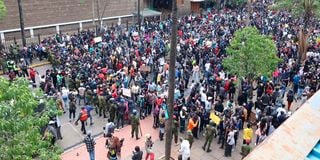Interior CS Kindiki sets tough rules ahead of anti-Finance Bill demos

Protesters during anti-Finance Bill demonstrations along Cardinal Otunga Street, Nairobi, on June 20, 2024.
What you need to know:
- Interior Cabinet Secretary Kindiki says the protests must end at 6:30pm.
- Protesters warned against attempting to force their way into protected areas.
Interior Cabinet Secretary Kithure Kindiki has warned against violation of rights and breach of public order ahead of the planned anti-Finance Bill protests on Tuesday.
Speaking on on Monday in Nairobi, Prof Kindiki also instructed security agencies to remain apolitical but to firmly deal with lawbreakers.
"Those who wish to exercise their constitutional rights are free to do so from tomorrow but must not break any law. Non-protesters and those with contrary views with the protesters are also bound by the same conditions," Kindiki said.
The CS also stated that the protests must end at 6:30pm and that protesters who will attempt to force their way into protected areas will be meet firm response from security agencies.
"They [protesters] must not obstruct, block, vandalise or otherwise destroy any private or public property and must adhere to the laws of Kenya including the Protected Areas Act that limits access to certain critical infrastructure for national security reasons,” Prof Kindiki said.
He warned against any form of interference with road, rail, sea or air transport. The CS appeared to caution against attempts by demonstrators to march to State House, or forcefully access Parliament Buildings.
Two youths were killed during protests last week. Mr Rex Masai died due to excessive bleeding after he was shot while Evans Kiratu succumbed to injuries after he was hit by a tear gas canister.
Prof Kindiki said protesters exercising their right under Article 37 of the Constitution must “remain peaceful and unarmed throughout... and must engage in a manner that does not promote violence or riots.”
The CS, who was flanked by Interior Principal Secretary Raymond Omollo, said the protesters must not breach public order and must not intimidate, harass or otherwise inconvenience members of the public who are not protesting.
“They must inform the police of their intentions to exercise this right. They must also inform the police of the routes they will take for purposes of providing escort and ensuring there is law and order,” Prof Kindiki said. The protesters, the CS noted, must not provoke, attack, injure or obstruct law enforcement officers or members of the public and must follow the guidelines of law enforcement officers to protect them from infiltrators.
“For the avoidance of doubt, non-protesters and other members of the public who hold a contrary view to that of the protesters are bound by the same limitations and must exercise their rights to disagree in the same manner.”
He spoke amid reports that pro-government legislators were planning to mobilise their supporters to hold counter-demonstrations. Prof Kindiki sought to assure Kenyans that the police will remain neutral but firm.
“Those who wish to exercise their constitutional right can do so today, tomorrow, and every day because it is their right to do so. But they must adhere to the rule of law,” the official added.

Interior Cabinet Secretary Kithure Kindiki (left) and Principal Secretary Raymond Omollo address journalists at Harambee House in Nairobi on June 24, 2024.
Prof Kindiki’s statement followed a warning by the African Commission on Human and Peoples’ Rights to the Kenyan government against trampling on citizens’ rights to hold peaceful demonstrations. The commission said the right to protest peaceably is enshrined under Article 11 of the African Charter.
“The commission calls on the Kenyan authorities to respect this right and to ensure that security forces exercise restraint and uphold the highest standards of human rights when managing public demonstrations,” the commission’s country rapporteur on Human Rights Solomon Ayele Dersso said in a statement.
Mr Dersso also called for alternative measures to alleviate the financial suffering of citizens.
“These measures could include targeted subsidies for essential goods, tax relief for low-income earners, and the implementation of robust social protection programs designed to support the most vulnerable segments of society.”
He called for immediate release of those arrested for participating in the peaceful protests “with utmost respect for due process of the law under Article 7 of the African Charter.”
The Kenyan government, the commission added, must also ensure respect for personal data protection.
“The government should immediately reconsider and amend the provision that allows the Kenya Revenue Authority (KRA) to access individuals' financial records without a warrant or prior notice. Upholding the right to privacy is essential to maintaining public trust and adhering to the principles of a human and peoples’ rights under the African Charter.”
The continental agency further expressed concerns that the protests on June 18 led to the arrest of more than 300 individuals.





